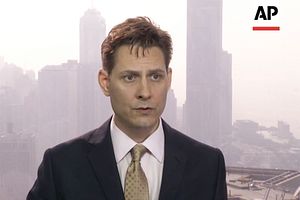Over the past 50 years, China has undeniably established itself as a global power. It has made progress on many fronts, particularly in furthering the development agenda. Nonetheless, President Xi Jinping’s efforts to cast his country as a responsible and benign super power ring hollow when his government continues to engage in hostage diplomacy. As a current academic dean and a former business executive and diplomat, I can unequivocally say that the world is eager to see China firmly commit to not using people as bargaining chips.
This is especially relevant to me because a staff member of the International Crisis Group – an organization that I co-chair – today marked his 1,000th day in Chinese detention for no other reason than the fact of his Canadian citizenship. Michael Kovrig, International Crisis Group’s senior advisor, and fellow Canadian Michael Spavor were detained in China on December 10, 2018, just 10 days after Huawei CFO Meng Wanzhou was detained in Canada pursuant to an extradition request from the United States. Recently, Spavor was sentenced to 11 years in jail and deportation. Kovrig’s sentence has not yet been issued. Both Kovrig and Spavor are held under difficult conditions with little access to the outside world.
Beijing argues that Meng’s detention was politically motivated – that it was meant to further the United States’ own leverage against Huawei. For its part, Ottawa and Washington perceive the two Canadians’ detentions as being clearly arbitrary and political. Canadian Prime Minister Justin Trudeau claims that Beijing draws a “direct link” between Meng’s case and the two Michaels. While calling for Kovrig and Spavor to be released, U.S. President Joe Biden remarked, “Human beings are not bartering chips.”
Beijing’s hostage diplomacy runs counter to its own interests. From my academic vantage point, I know all too well the importance of China opening itself up to study and healthy scrutiny, particularly by impartial experts like Michael Kovrig. His detention has a chilling effect on such studies. As a former business executive, I know cases like the two Michaels’ arbitrary detentions impact business decisions. The security of employees is paramount to any decision to enter or remain in a given market. Finally, as a former U.N. diplomat, I am aware that my colleagues are also focusing on these cases. Kovrig was a long-serving diplomat within the Canadian foreign service. U.N. Security Council representatives have noted this fact when denouncing his continued detention. Arbitrary detentions like these only give China’s competitors cause for concerns and coordination. It is again in Beijing’s own interest to avoid becoming the locus of multilateral criticism.
Additionally, stalemated problems between countries rarely resolve themselves. The Kovrig and Spavor cases exacerbate serious rifts between Washington and Beijing. The past several years have seen tensions consistently rise between Beijing and both Democratic and Republican-led U.S. administrations. Normalized relations between China and the West should not be taken for granted. The fates of the two Michaels are test cases for the direction Beijing chooses.
From each of these vantage points, both Michaels’ continued detentions are at odds with China’s desired reputation as an open, welcoming, and global power for positive change and modernity. Beijing can act differently. It should make a gesture commensurate to its status as a global leader and release Michael Kovrig and Michael Spavor immediately.

































